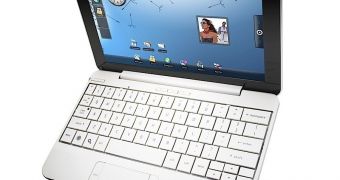Even though the birth of the media slate market seems to have cast a shadow upon the life expectancy of smartbooks, companies still seem willing to experiment with this device concept, especially when its development is, more or less, complete. In fact, back in February, HP was one of the first to officially unveil one such model, known as the Compaq Airlife 100. Unfortunately, the developer did not exactly keep the industry informed on what would come next, which allowed doubts to emerge on whether PC suppliers are still willing to try out this new device class.
Though it may have somewhat delayed the availability of the Airlife, HP does not seem willing to give up on smartbooks without a fight, which is why it recently added it to its official website. The compact gadget has a 10.1-inch resistive touchscreen display, with a maximum resolution of 1024 x 600, and, at its heart, it has a Qualcomm Snapdragon QSD8250 chipset, whose processor operates at a clock speed of 1GHz. The configuration also boasts a 92%-sized keyboard, 512MB RAM, a built-in flash storage unit of 16GB (15 are available to the user), 3G, WiFi and an SD card slot for extra storage.
Smartbooks are meant to combine superior specs, akin to netbooks, with the always-on capabilities of smartphones, which means that, more than anything, battery life must be extensive. HP's Airlife can supposedly survive for about 12 hours, thanks to the 28 Wh battery. This life is not exactly as long as what smartphones can show off, but HP does seem to have put more emphasis on performance. There is also the fact that it is quite unlikely for an end-user to be separated from a power source for more than this period of time.
Unfortunately, the Compaq Airlife 100 Snapdragon-powered smartbook still has not started selling and, currently, there is no way of knowing exactly when shipments commence. Nevertheless, it should not take too long for things to speed up now that the product page is up and running. When the Airlife does debut, it will be subsidized by Telefonica in Latin America and some European markets.

 14 DAY TRIAL //
14 DAY TRIAL //